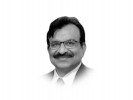As the election season approaches, we have started seeing different media outlets conducting political polls. We have already seen messages showing 90% popularity claims for one side or another. As an epidemiologist, I could safely state that most of these political polls in Pakistan are completely wrong and are just part of political campaigns.
Polls or surveys need to be done in a very methodological and scientific manner. Just think about it: A district X has one million people with 500,000 eligible voters. A poll taker or someone doing a survey can’t interview even a few hundred people. Based on very few individuals’ responses, he has to estimate or extrapolate results for hundreds of thousands of people. It’s not an impossible task, and in epidemiology, we do this all the time. If we want to know how many children are malnourished, it’s not possible for us to personally examine all children in the city or district. So, we design a survey, and then we need to select a few kids from the district to accurately estimate malnutrition. The first step is to calculate how many kids we need to personally examine in this district to accurately estimate malnourishment in children in this district. Once we get this number, we need to find out the best approach to identify or select these children to be physically examined. There are different methodologies, and we need to be aware of the strengths and challenges of each.
The most accurate system is complete randomisation. It saves results from many biases and errors. For example, you could have a voter list and then let the computer randomly select people. In developed countries, researchers used to pick some random phone numbers from the phone directory and then call them. That was true before mobile phones, as most houses in the West used to have one phone line. In our part of the world, where we don’t have a complete listing of people living in any area, we do cluster sampling. In this, we divide a city into different clusters (geographic). Once we have the required numbers of people we need to interview, we distribute them as per the population of each cluster, as some areas will be highly populated, and some will have a scant population. This makes sure that no area is over or under sampled. Each cluster is sometimes even subdivided into different sub-clusters. Then each team is tasked with going to the edge of each sector and making their way to the centre of the clusters. By this technique, we ensure the sampling of people living outside villages or cities who are normally marginalised and missed in most surveys.
Once we have results, we use a lot of statistical tests to check if any difference between these two groups is real or just due to chance. Even with the best techniques, there is still an element of chance. It is possible to pick certain similar people even in randomisation just by chance. We reject any results if the risk of chance is greater than 5% in our calculations. We also analyse how many people did not answer our questions, how many houses did not open their doors to us because it’s important to know if the poll was attended by all or just some sections of society.
Sensitive questions like which political leader you like or not are very difficult to answer by marginalised sections of society. Sometimes people will give an answer that they think the interviewer wants to hear. That is why any behavioural surveys need to be done in a discreet way in an atmosphere of trust. None of this happens in Pakistan.
Polls on Twitter, Facebook, newspapers or TV websites are just useless, as only a subsection of followers of each social media account are responding and this is no reflection of the general voting public.
There are ways we could also do qualitative assessments, but they are not polls and should not be given any numbers or percentages. The election is coming close, and you should vote based on how you rate your political party, not on what these fake polls are telling you. The one who really gets votes on election day will actually win.
Published in The Express Tribune, December 23rd, 2023.
Like Opinion & Editorial on Facebook, follow @ETOpEd on Twitter to receive all updates on all our daily pieces.





















 Toi Staff
Toi Staff Gideon Levy
Gideon Levy Belen Fernandez
Belen Fernandez Rami G Khouri
Rami G Khouri Mort Laitner
Mort Laitner Rachel Marsden
Rachel Marsden Bradley Blankenship
Bradley Blankenship Michael Kwet
Michael Kwet
